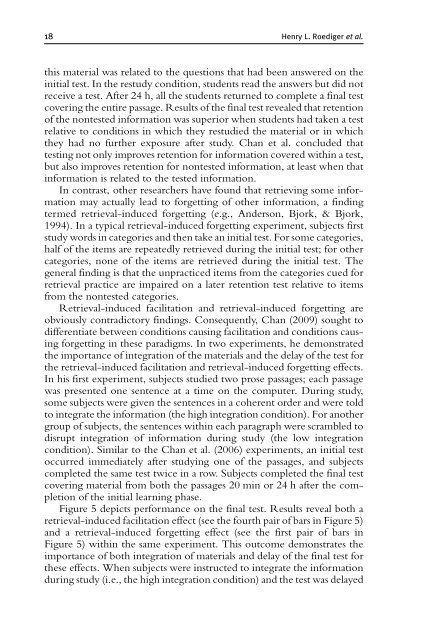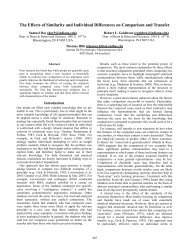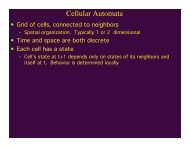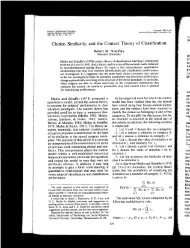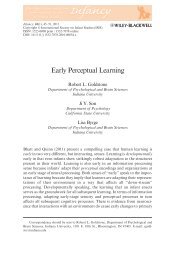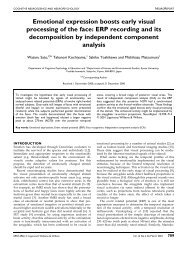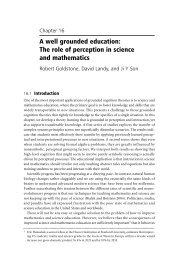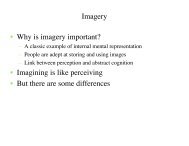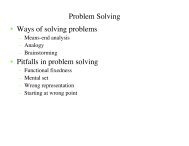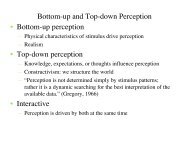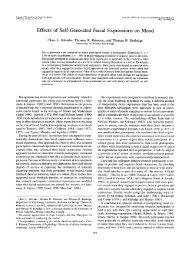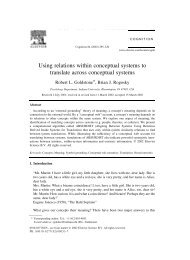the psychology of learning and motivation - Percepts and Concepts ...
the psychology of learning and motivation - Percepts and Concepts ...
the psychology of learning and motivation - Percepts and Concepts ...
You also want an ePaper? Increase the reach of your titles
YUMPU automatically turns print PDFs into web optimized ePapers that Google loves.
18 Henry L. Roediger et al.this material was related to <strong>the</strong> questions that had been answered on <strong>the</strong>initial test. In <strong>the</strong> restudy condition, students read <strong>the</strong> answers but did notreceive a test. After 24 h, all <strong>the</strong> students returned to complete a final testcovering <strong>the</strong> entire passage. Results <strong>of</strong> <strong>the</strong> final test revealed that retention<strong>of</strong> <strong>the</strong> nontested information was superior when students had taken a testrelative to conditions in which <strong>the</strong>y restudied <strong>the</strong> material or in which<strong>the</strong>y had no fur<strong>the</strong>r exposure after study. Chan et al. concluded thattesting not only improves retention for information covered within a test,but also improves retention for nontested information, at least when thatinformation is related to <strong>the</strong> tested information.In contrast, o<strong>the</strong>r researchers have found that retrieving some informationmay actually lead to forgetting <strong>of</strong> o<strong>the</strong>r information, a findingtermed retrieval-induced forgetting (e.g., Anderson, Bjork, & Bjork,1994). In a typical retrieval-induced forgetting experiment, subjects firststudy words in categories <strong>and</strong> <strong>the</strong>n take an initial test. For some categories,half <strong>of</strong> <strong>the</strong> items are repeatedly retrieved during <strong>the</strong> initial test; for o<strong>the</strong>rcategories, none <strong>of</strong> <strong>the</strong> items are retrieved during <strong>the</strong> initial test. Thegeneral finding is that <strong>the</strong> unpracticed items from <strong>the</strong> categories cued forretrieval practice are impaired on a later retention test relative to itemsfrom <strong>the</strong> nontested categories.Retrieval-induced facilitation <strong>and</strong> retrieval-induced forgetting areobviously contradictory findings. Consequently, Chan (2009) sought todifferentiate between conditions causing facilitation <strong>and</strong> conditions causingforgetting in <strong>the</strong>se paradigms. In two experiments, he demonstrated<strong>the</strong> importance <strong>of</strong> integration <strong>of</strong> <strong>the</strong> materials <strong>and</strong> <strong>the</strong> delay <strong>of</strong> <strong>the</strong> test for<strong>the</strong> retrieval-induced facilitation <strong>and</strong> retrieval-induced forgetting effects.In his first experiment, subjects studied two prose passages; each passagewas presented one sentence at a time on <strong>the</strong> computer. During study,some subjects were given <strong>the</strong> sentences in a coherent order <strong>and</strong> were toldto integrate <strong>the</strong> information (<strong>the</strong> high integration condition). For ano<strong>the</strong>rgroup <strong>of</strong> subjects, <strong>the</strong> sentences within each paragraph were scrambled todisrupt integration <strong>of</strong> information during study (<strong>the</strong> low integrationcondition). Similar to <strong>the</strong> Chan et al. (2006) experiments, an initial testoccurred immediately after studying one <strong>of</strong> <strong>the</strong> passages, <strong>and</strong> subjectscompleted <strong>the</strong> same test twice in a row. Subjects completed <strong>the</strong> final testcovering material from both <strong>the</strong> passages 20 min or 24 h after <strong>the</strong> completion<strong>of</strong> <strong>the</strong> initial <strong>learning</strong> phase.Figure 5 depicts performance on <strong>the</strong> final test. Results reveal both aretrieval-induced facilitation effect (see <strong>the</strong> fourth pair <strong>of</strong> bars in Figure 5)<strong>and</strong> a retrieval-induced forgetting effect (see <strong>the</strong> first pair <strong>of</strong> bars inFigure 5) within <strong>the</strong> same experiment. This outcome demonstrates <strong>the</strong>importance <strong>of</strong> both integration <strong>of</strong> materials <strong>and</strong> delay <strong>of</strong> <strong>the</strong> final test for<strong>the</strong>se effects. When subjects were instructed to integrate <strong>the</strong> informationduring study (i.e., <strong>the</strong> high integration condition) <strong>and</strong> <strong>the</strong> test was delayed


